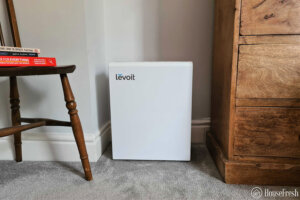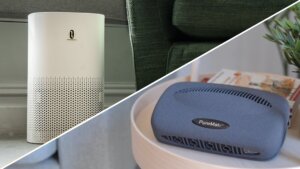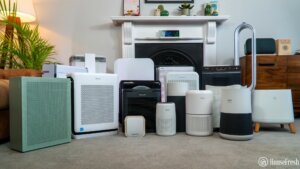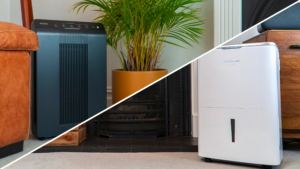When you walk into a room that smells like fruit or flowers, there’s probably a diffuser humming somewhere.
Diffusers are a great tool to safely disperse essential oils, which can burn your skin if directly applied. Humidifiers, on the other hand, add moisture to the air, which acts as a temporary remedy for dry skin and congestion.
Though similar in mechanics, their purposes differ; understanding these differences is essential before purchasing one or the other. What’s the fuss about these two products, and what makes them useful and different from each other?
This handy table breaks the basics down:
Humidifier
Diffuser
From these differences, it’s easy to see that a humidifier is your friend if you need additional moisture. However, to make the air smell nicer, go for a diffuser.
If you’re unsure if a product is a humidifier or a diffuser, check its tank size. Humidifiers often have large tanks holding about a gallon, while diffusers have a capacity equal only to about a cup of water.
Read on for more detailed ins and outs of diffusers and humidifiers.
What is a humidifier?
Simply put, a humidifier releases moisture into the air. If you live in a dry climate, humidifiers are made for you.
Humidifiers rely on water to increase the moisture level in a room and can typically hold around half a gallon of water. Humidifiers aren’t usually necessary in wet or humid climates; a dehumidifier is your best bet. If too much moisture is in the air, mold can form around the house.
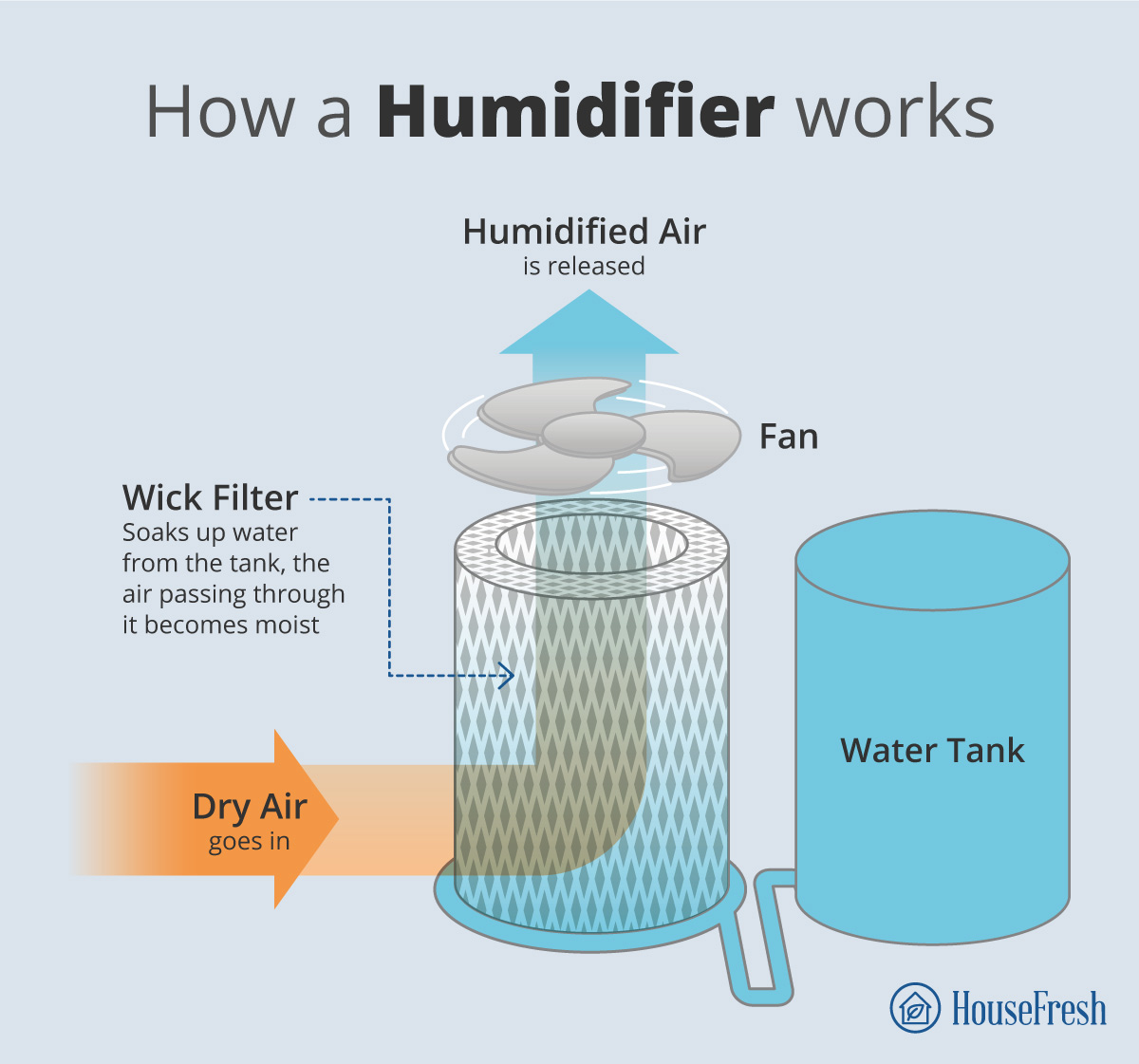
There are three main types of humidifiers:
- Evaporative humidifiers use a reservoir that stores cold water and empties it into a basin. A wicking filter absorbs water from the basin. It then blasts air through the wet filter with a fan.
- Ultrasonic humidifiers generate water droplets by vibrating a metal diaphragm at an ultrasonic frequency.
- Steam humidifiers heat water and distribute it into the room as warm steam. This is the most basic and hence least expensive way of introducing moisture to the air.
The benefits of a humidifier
Humid weather doesn’t appeal to anybody, given that awful hot and sticky feeling. You likely already understand the frustration of having dry skin and a scratchy throat. Adding water to the air via a humidifier will help improve your skin’s hydration and can even unclog your stuffy nose.
Additionally, more water in the air allows for easy breathing and helps prevent itching in your nose and throat. Breathing in dry air puts you at risk for a sore throat, sinus problems, dry cough and itchy nose. Increasing moisture in the air reduces these risks and soothes irritation in your airways.
For productive coughs, humidity can also help your body clear mucus for more comfortable breathing. People with sinus problems will significantly benefit from these humidifiers designed to play nicely with their noses.
If you’ve bought a portable humidifier, you can hydrate one room at a time. The time it takes to raise the humidity levels in a room depends on your humidifier’s size and the volume of the room.
For those with large rooms, buy humidifiers specifically built for them.
Humidifiers are most commonly used in winter when the air is dehydrated. You can buy both “cool mist” and “warm mist” varieties, letting you adhere to your desired room temperature while protecting your skin and keeping you fresh and comfortable.
What is a diffuser?
Diffusers release fragrance into the air. Though they sometimes release a little water, raising moisture levels isn’t their primary purpose.
Diffusers are a safe way to disperse essential oils around your home. Oils evoke different feelings and moods and improve your mental and physical state. This art of choosing scents is called aromatherapy.
Not all diffusers are designed the same. There are four common types:
- Evaporative diffusers are fitted with little fans that blow air through a piece of tissue or pad holding drops of essential oil. The air that comes out of the machine is beautifully scented.
- Heated diffusers work by evaporating water and essential oils into the air. Typically, you drop your oil into the water, and the solution is heated gently. The resulting vapor is then released into the air.
- Ultrasonic diffusers don’t use heat; they use high-pitched sound frequencies that produce vibrations, jostling the essential oil particles and releasing them as mist.
- Nebulizer diffusers are recognized by their “droplet” shape that tapers into a thin nozzle at the top. Pressurized air breaks down essential oils into particles and shoots them as a mist. Uniquely, no heat or water is required.
The benefits of a diffuser
Diffusers are useful tools for aromatherapy. Breathing in certain smells can alter your mood, making you feel refreshed or relaxed. You can use your diffuser during meditation or a massage for added serenity.
Another upside is that diffusers are also easy to use. You may need to add water or insert a cotton pad with drops of essential oil, but that’s just about it.
Some diffusers also come with blinking lights, but if this interrupts your sleep, buy one that allows you to control this feature. Additionally, most diffusers operate quietly, so getting a good night’s sleep is a lot easier.
Once you’ve got the hang of aromatherapy, feel free to try out any essential oil you like. Citrus, rose, tea tree, sandalwood and peppermint are great options for starting out.
What about humidifier and diffuser combos?
Using one for the other is not recommended if you have an older humidifier or diffuser. That is, you generally shouldn’t use a humidifier as a diffuser (or vice versa). Essential oils can damage your humidifier and diffusers simply don’t hold enough water to be effective at moistening the air. You should have a separate diffuser for your aromatherapy needs.
Understandably, buying two devices can be costly or appear unsightly. Fortunately, it’s now possible to buy humidifiers that double as diffusers.
If you’re a fan of a two-in-one, Honeywell has a range of warm mist and ultrasonic cool mist humidifiers specially designed to hold essential oils. This way, you gain access to the benefits of moist air while also having the option to add some fragrance depending on your mood.
For a compact humidifier + diffuser combo that fits perfectly on your work desk, check out Honeywell’s Ultra Glow Light Changing Humidifier and Diffuser. It even has a neat adjustable light feature that’s perfect anywhere in the house, any time of the day.
Final thoughts
Despite being different products, humidifiers and diffusers create a cozy, soothing home atmosphere that helps improve your mental and physical well-being.
The added moisture in the air treats dehydrated skin and relieves an itchy, congested nose and throat. With a diffuser, you can set the mood for a relaxing night or a meaningful meditation session. These two products will refresh you and are just the pick-me-ups you need in your home.
And with modern technologies, you can even combine them into one product. With this duo combo, a house truly becomes a home.


